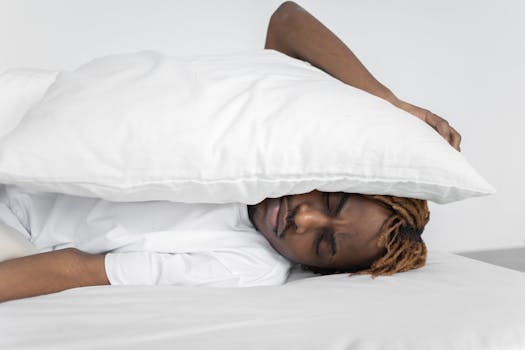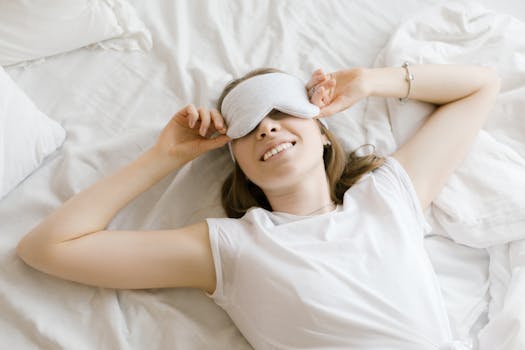
“
Creating a Balanced Sleep Routine for Better Rest
Creating a balanced sleep routine for better rest is essential for our overall health and wellbeing. A good night’s sleep can help us feel refreshed, revitalized, and ready to take on the day. In this article, we will explore the importance of sleep, the benefits of a balanced sleep routine, and provide tips on how to create a sleep routine that works for you.
Introduction to Sleep Routines

Sleep is a vital part of our daily lives, and it plays a critical role in our physical and mental health. During sleep, our bodies repair and regenerate damaged cells, build bone and muscle, and strengthen our immune systems. Sleep also helps us to process and consolidate memories, and it can improve our cognitive function and mood. A balanced sleep routine can help us get the sleep we need to feel rested and refreshed.
Benefits of a Balanced Sleep Routine

A balanced sleep routine can have numerous benefits for our overall health and wellbeing. Some of the benefits of a balanced sleep routine include:
- Improved sleep quality: A balanced sleep routine can help us fall asleep faster, sleep more soundly, and wake up feeling more rested and refreshed.
- Increased energy: A good night’s sleep can help us feel more energized and alert, which can improve our productivity and overall quality of life.
- Better mood: Sleep can help regulate our mood, and a balanced sleep routine can help reduce stress and anxiety.
- Improved physical health: Sleep can help our bodies repair and regenerate damaged cells, which can improve our overall physical health.
- Improved cognitive function: Sleep can help improve our cognitive function, including our memory, attention, and problem-solving skills.
Creating a Balanced Sleep Routine

Creating a balanced sleep routine can be simple and easy. Here are some tips to help you get started:
- Set a consistent sleep schedule: Go to bed and wake up at the same time every day, including weekends.
- Create a relaxing bedtime routine: Develop a calming pre-sleep routine, such as reading a book, taking a warm bath, or practicing relaxation techniques.
- Make your sleep environment comfortable: Create a sleep-conducive environment by making your bedroom dark, quiet, and cool.
- Avoid stimulating activities before bedtime: Avoid stimulating activities, such as watching TV, playing video games, or using electronic devices, at least an hour before bedtime.
- Avoid caffeine and nicotine: Avoid consuming caffeine and nicotine close to bedtime, as they can disrupt sleep.
Conclusion

Creating a balanced sleep routine for better rest is essential for our overall health and wellbeing. By following the tips outlined in this article, you can create a sleep routine that works for you and helps you get the sleep you need to feel rested and refreshed. Remember, a good night’s sleep is just as important as a healthy diet and regular exercise, so make it a priority and start creating your balanced sleep routine today.
Creating a balanced sleep routine for better rest is crucial for our overall health and wellbeing. A good night’s sleep can help us feel refreshed, revitalized, and ready to take on the day. In addition to the tips outlined above, there are many other ways to create a balanced sleep routine. Some other tips include:
- Getting regular exercise: Regular exercise can help improve sleep quality, but avoid vigorous exercise within a few hours of bedtime.
- Practicing relaxation techniques: Relaxation techniques, such as deep breathing, progressive muscle relaxation, and mindfulness meditation, can help reduce stress and anxiety and improve sleep.
- Getting some morning sunlight: Exposure to natural light in the morning can help regulate our circadian rhythms and improve sleep.
- Avoiding heavy meals close to bedtime: Eating a heavy meal close to bedtime can disrupt sleep, so try to finish eating at least 2-3 hours before bedtime.
- Trying aromatherapy: Certain scents, such as lavender and vanilla, can promote relaxation and improve sleep.
In conclusion, creating a balanced sleep routine for better rest is essential for our overall health and wellbeing. By following the tips outlined in this article and making sleep a priority, you can improve the quality of your sleep and wake up feeling rested, refreshed, and ready to take on the day.
Common Sleep Disorders and How to Overcome Them

Sleep disorders are common and can disrupt our sleep patterns, making it difficult to get the rest we need. Some common sleep disorders include:
- Insomnia: Insomnia is characterized by difficulty falling asleep or staying asleep, and can be caused by stress, anxiety, or other underlying medical conditions.
- Sleep apnea: Sleep apnea is a condition in which a person stops breathing for short periods during sleep, and can be caused by obesity, smoking, or other underlying medical conditions.
- Restless leg syndrome: Restless leg syndrome is a condition in which a person experiences uncomfortable sensations in their legs, such as itching, tingling, or burning, and can be caused by iron deficiency, diabetes, or other underlying medical conditions.
- Narcolepsy: Narcolepsy is a condition in which a person experiences excessive daytime sleepiness, and can be caused by a genetic predisposition or other underlying medical conditions.
Overcoming sleep disorders requires a combination of lifestyle changes, medical treatment, and therapies. Some ways to overcome sleep disorders include:
- Seeking medical attention: If you suspect you have a sleep disorder, seek medical attention from a healthcare professional.
- Practicing relaxation techniques: Relaxation techniques, such as deep breathing, progressive muscle relaxation, and mindfulness meditation, can help reduce stress and anxiety and improve sleep.
- Getting regular exercise: Regular exercise can help improve sleep quality, but avoid vigorous exercise within a few hours of bedtime.
- Creating a sleep-conducive environment: Create a sleep-conducive environment by making your bedroom dark, quiet, and cool.
- Trying cognitive behavioral therapy: Cognitive behavioral therapy (CBT) is a type of therapy that can help you identify and change negative thought patterns and behaviors that contribute to sleep disorders.
Sleep and Mental Health

Sleep and mental health are closely linked, and sleep disorders can contribute to the development of mental health conditions such as depression and anxiety. Some ways to promote sleep and mental health include:
- Practicing mindfulness: Mindfulness practices, such as meditation and deep breathing, can help reduce stress and anxiety and improve sleep.
- Getting regular exercise: Regular exercise can help improve sleep quality and reduce symptoms of depression and anxiety.
- Seeking social support: Social support from friends, family, and mental health professionals can help you cope with stress and anxiety and improve sleep.
- Trying relaxation techniques: Relaxation techniques, such as progressive muscle relaxation and visualization, can help reduce stress and anxiety and improve sleep.
- Getting enough sleep: Getting enough sleep is essential for mental health, so aim for 7-9 hours of sleep per night.
Sleep and Physical Health

Sleep and physical health are closely linked, and sleep disorders can contribute to the development of physical health conditions such as diabetes, cardiovascular disease, and obesity. Some ways to promote sleep and physical health include:
- Getting regular exercise: Regular exercise can help improve sleep quality and reduce the risk of chronic diseases.
- Eating a healthy diet: Eating a healthy diet that includes plenty of fruits, vegetables, and whole grains can help promote sleep and physical health.
- Getting enough sleep: Getting enough sleep is essential for physical health, so aim for 7-9 hours of sleep per night.
- Managing stress: Chronic stress can disrupt sleep and contribute to the development of physical health conditions, so find healthy ways to manage stress such as exercise, meditation, or yoga.
- Avoiding stimulants: Avoid consuming stimulants such as caffeine and nicotine close to bedtime, as they can disrupt sleep and contribute to the development of physical health conditions.
Conclusion

In conclusion, creating a balanced sleep routine for better rest is essential for our overall health and wellbeing. By following the tips outlined in this article and making sleep a priority, you can improve the quality of your sleep and wake up feeling rested, refreshed, and ready to take on the day. Remember, sleep is just as important as a healthy diet and regular exercise, so make it a priority and start creating your balanced sleep routine today.
Final Thoughts

Creating a balanced sleep routine for better rest is a process that takes time, effort, and patience. It’s essential to be consistent and make sleep a priority in your daily life. By following the tips outlined in this article and making sleep a priority, you can improve the quality of your sleep and wake up feeling rested, refreshed, and ready to take on the day.
Creating a balanced sleep routine for better rest is crucial for our overall health and wellbeing. A good night’s sleep can help us feel refreshed, revitalized, and ready to take on the day. Remember, sleep is just as important as a healthy diet and regular exercise, so make it a priority and start creating your balanced sleep routine today.
In addition to the tips outlined in this article, there are many other ways to create a balanced sleep routine. Some other tips include:
- Trying aromatherapy: Certain scents, such as lavender and vanilla, can promote relaxation and improve sleep.
- Getting some morning sunlight: Exposure to natural light in the morning can help regulate our circadian rhythms and improve sleep.
- Avoiding heavy meals close to bedtime: Eating a heavy meal close to bedtime can disrupt sleep, so try to finish eating at least 2-3 hours before bedtime.
- Practicing gratitude: Practicing gratitude can help reduce stress and anxiety and improve sleep.
- Trying progressive muscle relaxation: Progressive muscle relaxation is a technique that can help reduce stress and anxiety and improve sleep.
In conclusion, creating a balanced sleep routine for better rest is essential for our overall health and wellbeing. By following the tips outlined in this article and making sleep a priority, you can improve the quality of your sleep and wake up feeling rested, refreshed, and ready to take on the day. Remember, sleep is just as important as a healthy diet and regular exercise, so make it a priority and start creating your balanced sleep routine today.
See more:
https://www.sleepfoundation.org/
https://www.mayoclinic.org/healthy-lifestyle/adult-health/expert-answers/sleep/faq-20407445
https://www.nhlbi.nih.gov/health-topics/sleep-deprivation






